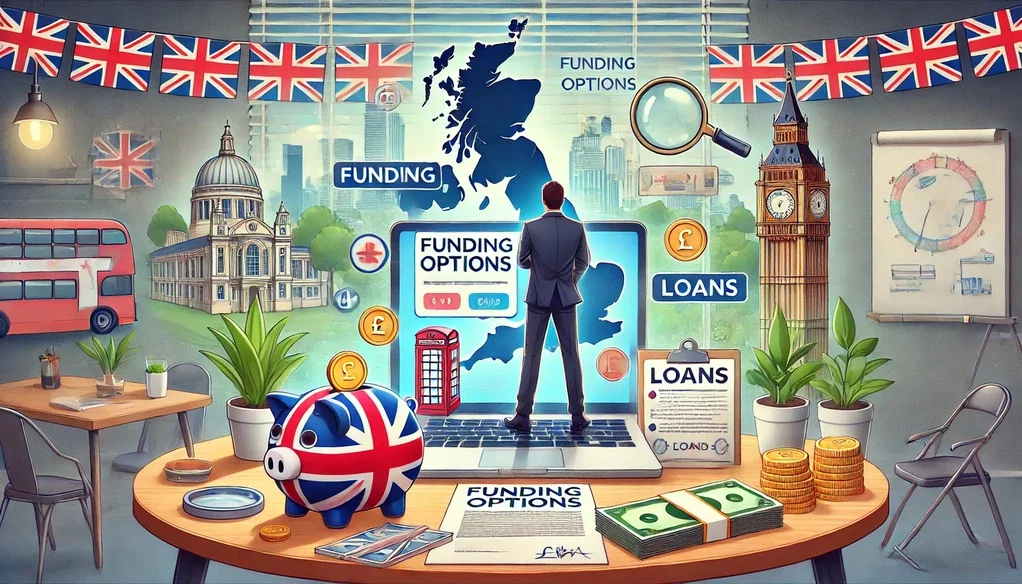Launching a startup in the UK is an exhilarating adventure, but securing the necessary funding can feel like navigating a labyrinth. Fear not! This comprehensive guide will illuminate the diverse avenues available for funding start-up ventures, from government grants and loans to savvy bootstrapping strategies and innovative alternative options. Whether you're seeking your first round of funding start-up capital or exploring ways to fuel your growing business, this guide will provide valuable insights and resources to help you make informed decisions.
Understanding Your Funding Start Up Needs: The First Step

Before exploring the various options for funding start-up ventures, it's crucial to understand your financial requirements thoroughly. This initial assessment will empower you, giving you a sense of control and confidence to make informed decisions and choose the right funding strategies for your specific needs. By comprehending your start-up costs, projected expenses, and revenue goals, you can clearly understand how much funding you need and confidently identify the most suitable options.
Grants: The Golden Ticket for Non-Repayable Funding Start Up Capital
Government grants are like golden tickets for startups – they offer non-repayable funds to fuel your innovation and growth. The UK government, various organisations, and charities provide grants tailored to specific industries, regions, and business goals, making them an attractive and hopeful option for those seeking funding start up capital.
Innovation Grants: These grants support businesses developing groundbreaking products, services, or processes that have the potential to disrupt the market and drive economic growth.
Research and Development (R&D) Grants: Funding research and development activities is crucial for innovation. R&D grants help businesses explore new technologies, improve existing products, and develop cutting-edge solutions.
Growth Grants: As your startup gains traction, growth grants can provide the financial boost needed to expand your operations, create jobs, and increase your market share.
Sector-Specific Grants: Certain sectors, such as technology, manufacturing, or creative industries, may have dedicated grant programs to foster innovation and competitiveness.
Regional Grants: Some grants are specifically designed to support businesses operating in particular regions of the UK, aiming to stimulate local economic development.
Social Enterprise Grants: If your startup has a social or environmental mission, you may be eligible for grants that support businesses with a positive impact.
Pro Tip: Grant applications can be competitive, so thoroughly research eligibility criteria, craft a compelling proposal, and showcase your startup's potential impact to increase your chances of securing funding start up capital through grants.
Loans: Leveraging Debt for Strategic Growth in Funding Start Ups
Business loans offer a lump sum of capital that you repay over time with interest. They can be a valuable tool for funding start up ventures, providing the necessary resources to invest in growth initiatives, expand operations, or manage cash flow during challenging periods.
Start-Up Loans: The UK government's Start-Up Loans scheme offers affordable loans and mentorship to new businesses with high-growth potential. This can be a great way to secure funding start up capital and gain valuable guidance from experienced mentors, making you feel supported and guided in your journey.
Bank Loans: Traditional or unsecured bank loans can be a reliable source of funding start up capital. However, they often require a solid business plan, an excellent financial track record, and sometimes collateral.
Alternative Lenders: Online and peer-to-peer lending platforms offer greater flexibility and faster loan processing than traditional banks. These platforms can be an attractive option for start-ups that may not meet traditional lenders' strict criteria.
Invoice Financing: If your start-up has unpaid invoices, invoice financing can unlock the funds in those invoices, providing a much-needed cash flow boost.
Pro Tip: Compare interest rates, repayment terms, and fees from different lenders to find your start-up's most favourable loan option.
Equity Financing: Inviting Investors on Your Funding Start Up Journey
Equity financing involves raising capital by selling a portion of your company's ownership to investors. This can be a suitable option for startups with high growth potential that require substantial funding to scale their operations. Simply put, you're giving up a piece of your company in exchange for the funds you need to grow.
Angel Investors are affluent individuals who invest their own money in early-stage start-ups in exchange for equity and often provide mentorship and guidance. They can be valuable partners in your funding start-up journey, offering both financial support and industry expertise.
Venture Capital (VC) Firms: VC firms invest in high-potential start-ups with the expectation of significant returns. VC funding typically comes in multiple rounds as your business grows and achieves critical milestones.
Crowdfunding: Crowdfunding platforms allow you to raise funds online from a large pool of individuals. You can offer equity in exchange for investment (equity crowdfunding) or provide rewards or products in return for contributions (rewards-based crowdfunding).
Pro Tip: To attract investors, prepare a compelling pitch deck that clearly articulates your start-up's vision, growth potential, and market opportunity.
Bootstrapping: Building Your Empire with Sweat Equity
Bootstrapping is a self-funding approach where you finance your startup using your own resources. This strategy lets you maintain complete control over your company and avoid taking on debt or diluting your equity.
Self-Funding: Use your personal savings, investments, or assets to finance your startup's initial expenses.
Reinvesting Profits: As your business generates revenue, reinvest your profits back into the company to fuel further growth.
Minimising Expenses: Be frugal with your spending, negotiate favourable terms with suppliers, and prioritise essential investments to maximise your resources.
Pre-selling or Crowdfunding: Generate early revenue by pre-selling products or services or launching a crowdfunding campaign to gauge market interest and raise funds.
Pro Tip: Bootstrapping requires discipline, resourcefulness, and a lean approach to operations. It may not be suitable for all start-ups, but it can be a viable option for those with limited funding needs or who value maintaining complete control over their business.
Alternative Funding: Unconventional Avenues for Funding Start Up Ventures
Beyond traditional funding sources, a variety of alternative options exist for funding start up ventures. These can include angel investors, venture capital, or even unconventional methods like selling future revenue streams.
Government Programs: Explore government schemes that offer tax incentives, grants, or loans for specific industries or activities. These programs can provide valuable financial support for startups.
Business Competitions: Participating in pitch competitions can be a great way to win cash prizes and gain exposure for your startup. It's also an opportunity to network with potential investors and mentors.
Incubators and Accelerators: These programs offer mentorship, resources, and potential funding opportunities for early-stage startups. They can provide a supportive environment to nurture your business and accelerate its growth.
Pro Tip: Research alternative funding options that align with your business's values and goals. Some options may come with strings attached, so carefully evaluate the terms and conditions before proceeding.
Choosing Your Funding Start Up Path: A Strategic Decision
The best funding option for your startup will depend on various factors, including:
Stage of Your Business: Early-stage startups may rely on bootstrapping and grants, while later-stage companies may seek equity financing or loans.
Funding Amount: Consider how much capital you need to achieve your business goals. Some funding options are better suited for smaller amounts, while others can provide more significant sums.
Risk Tolerance: Assess your comfort level with debt or giving up equity in your company. Each funding option comes with its own level of risk and reward.
Remember: Don't limit yourself to a single funding source. Combining different options, such as bootstrapping with a small loan or a grant, can provide the flexibility and resources you need to thrive.

